Invited Speakers

Dr Nima Khalighinejad
Oxford University
Dr. Nima Khalighinejad is a postdoctoral research associate at the Decisions & Action lab at Oxford University. His research focusses in understanding the neural mechanisms underlying action initiation.
Decision-making studies often focus on brain mechanisms for selecting between choices. However, another important, and often neglected, aspect of decision-making concerns whether, at any given point in time, it is worth taking any action at all. By performing a series of experiments in humans and non-human primates we investigated the neural mechanisms that underlie free voluntary action or that translate a desire into an action. First, we showed how macaques made decisions about when it is worth acting as a result of activity patterns that emerge in and between the anterior cingulate cortex (ACC) and the basal forebrain (BF). Activity in these structures mediated the influence of environmental features, such as its potential for reward, on whether an action will be emitted by the macaque. Second, we used a novel brain stimulation technique, transcranial ultrasound stimulation, to show the causal importance of ACC and BF in decisions about when to act. Third, by using ultra-high field functional magnetic resonance imaging (7T fMRI) we demonstrated the importance of the basal forebrain-cingulate circuit in humans and identified a multi-layered circuit in the human brain originating far beyond the medial frontal areas typically linked to human voluntary action initiation starting in the basal forebrain, pedunculopontine nucleus, and habenula, converging in the substantia nigra, and only then projecting to striatum and cortex.

Dr David Thura
Lyon Neuroscience Research Centre
Dr. David Thura is an Inserm researcher at the Lyon Neuroscience Research Center. He is interested in the neural mechanisms underlying the higher-order brain functions linking perception and action, and his work combines elecrophysiological, psychophysical and computational techniques in humans and non-human primates.
Although decision-making has traditionally been assumed to be distinct from movement execution, for many years a growing body of data has reported neural correlates of decision variables in many regions associated with motor control, casting doubt on that assumption. In this presentation, I’ll show evidence that decision-making and action execution are two modes of a unified dynamical system implemented in large distributed populations of neurons. We recorded neurons in the dorsal premotor cortex, the primary motor cortex, the dorsolateral prefrontal cortex and in the external and internal segments of the globus pallidus of two monkeys trained to perform a probabilistic reach decision task in which sensory evidence evolves within each trial. With “state-space” analyses, I’ll show how these areas share labor during the decision process and how activity patterns are compatible with a dynamical attractor model in which cortical activity reflects a biased competition between actions, gradually amplified by an urgency signal from the basal ganglia.

Dr Annika Boldt
UCL
Dr. Annika Boldt is a Sir Henry Wellcome Postdoctoral Fellow at the Metacognition & Executive Functions Group at UCL. She is interested in how the human brain is capable of forming metacognitive judgements, and how metacognition serves to optimise behaviour, ensuring that we have control over what we are doing.
TBC

Prof Birte Forstmann
Amsterdam University
Professor Birte Forstmann is the Director of the Amsterdam Brain and Cognition (ABC) Center in Amsterdam. Her general research goal is to understand the brain mechanisms that allow people to adapt quickly to changes in their environment and her work combines mathematical modeling with functional magnetic resonance imaging (fMRI), diffusion weighted imaging (DWI), ultra-high resolution 7T MRI, electroencephalography (EEG), and postmortem work.
TBC

Prof Patrick Haggard
UCL
Prof. Patrick Haggard leads the 'Action & Body' lab at the Institute of Cognitive Neuroscience at UCL, London. His research group focusses on cognitive aspects of two sensorimotor processes that underlie all human behaviour: the control of voluntary action and the experience we have of our own body.
TBC

Dr Redmond O’Connell
Trinity College, Dublin
Dr. Redmond O’Connell is Associate Professor at the School of Psychology, Trinity College Dublin and a principal investigator at the Trinity College Institute of Neuroscience. His lab is seeking to understand the computations and neural processes that underpin decision making and metacognition. Their research utilizes a combination of psychophysics, mathematical modelling and non-invasive human brain electrophysiology.
TBC

Dr Elisabet Parés-Pujolràs
UCL
Dr. Elisabet Parés-Pujolràs is a postdoctoral research associate at the Action & Body lab at UCL. Her research investigates the neural mechanisms underlying voluntary action control during the decision-making process driving action selection and action initiation.
To interact meaningfully with its environment, an agent must integrate external information with its own internal states. In a set of two studies, we identified a neural correlate that tracks how categorical choice unfolds as sequential evidence is sampled in various urgency conditions. In our task participants had to monitor long sequences of discrete visual stimuli and decide which out of two sets of stimuli was most frequent. In a first experiment, we found that the classic P3 event-related potential evoked by sequential items tracked decision formation during evidence accumulation and predicted participants’ categorical choices on a single trial level, both when evidence was strong and when it was ambiguous. Participants’ reaction times and the evolution of the P3 could be accurately explained by a model including mutually inhibiting accumulators for the two categorical choice outcomes, and a context-dependent urgency signal that grows linearly over time. In a second experiment using a variation of the same paradigm, we replicated the finding that the P3 tracks categorical choice formation and we showed that it can be used to track changes of mind. We further show that the P3 tracks not only linear increases in urgency over time, but also sudden changes in the speed/accuracy regimes over the course of a single decision. These findings provide a valuable neural marker that reflects the interaction between external (evidence) and internal (urgency) sources of information during evidence accumulation.

Dr Paula Banca
Cambridge University
Dr. Paula Banca is a Sir Henry Wellcome Postdoctoral Fellow at the Department of Psychology and the Behavioural and Clinical Neuroscience Institute (BCNI), at Cambridge University. Her research is aimed at understanding the neural mechanisms underlying action control processes, which are impaired in disorders of compulsivity and impulsivity such as OCD, drug addiction, behavioural addictions and ADHD. She studies the frontal lobes of the brain, their function and their connections with other regions, which are particularly relevant to psychiatric disorders, with a view to develop more effective treatments.
The compulsive behaviour typically observed in patients with obsessive-compulsive disorder (OCD) is likely related to abnormalities in decision-making. The inability to commit to ultimate decisions, for example, patients unable to decide whether their hands are sufficiently clean, may reflect failures in accumulating sufficient evidence before a decision. I used a low-level perceptual discrimination task (the random-dot-motion task, RDMT) and two response conflict control tasks to investigate the process of evidence accumulation in OCD, specifically to test the hypothesis of enhanced evidence accumulation in OCD patients relative to healthy volunteers. I will show how healthy humans and OCD patients differ in their response strategies/decision-making processes and will provide evidence for impaired decision-formation processes in OCD, with a differential influence of high and low uncertainty contexts on evidence accumulation (decision threshold) and on the quality of evidence gathered (drift rates). I will further emphasise that OCD patients are sensitive to monetary incentives, heightening speed in the speed-accuracy tradeoff, improving evidence accumulation.

Dr Claire Gillan
Trinity College, Dublin
Dr. Claire Gillan is an assistant professor at Trinity College Dublin and the head of the Gillan Lab. Claire's lab at Trinity College Dublin is interested in developing novel approaches to studying brain health in psychiatric and ageing populations - a key goal is to develop objective tests that can be used to predict who will respond to which treatment.
TBC